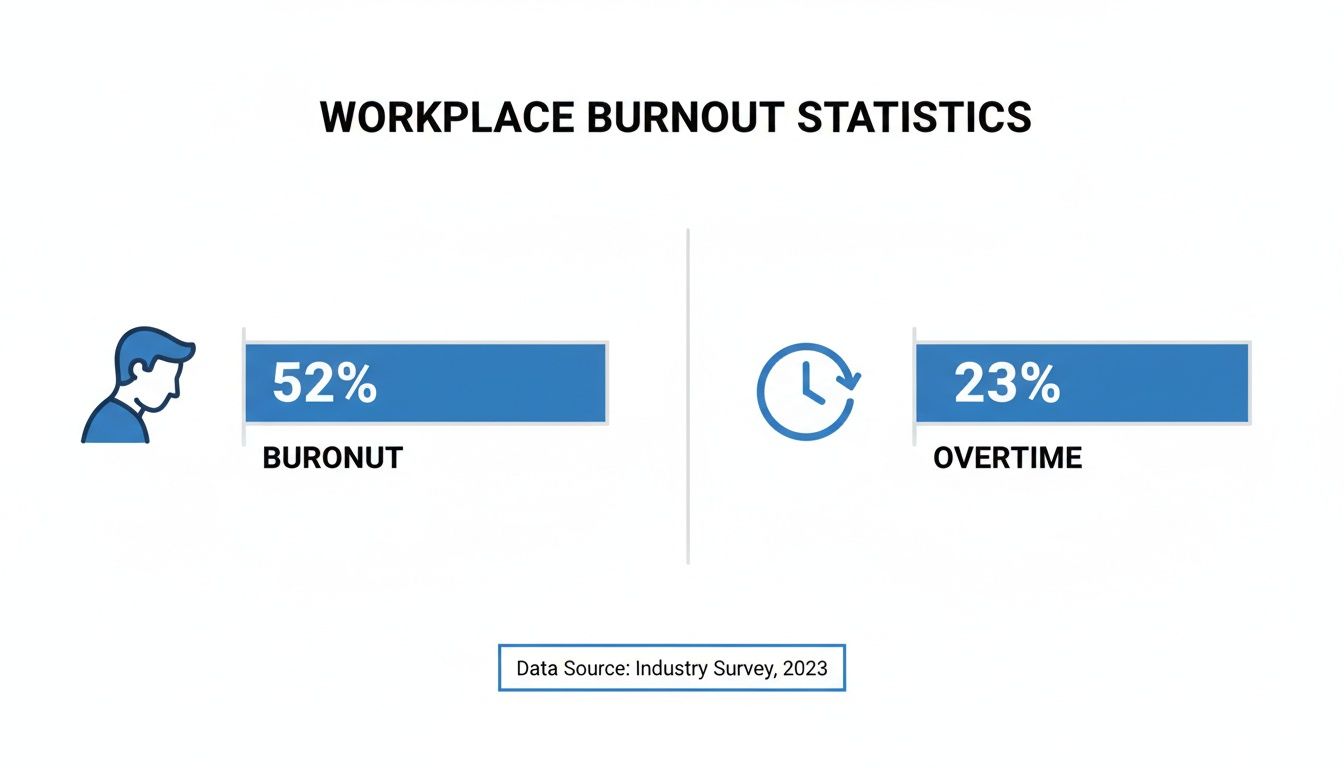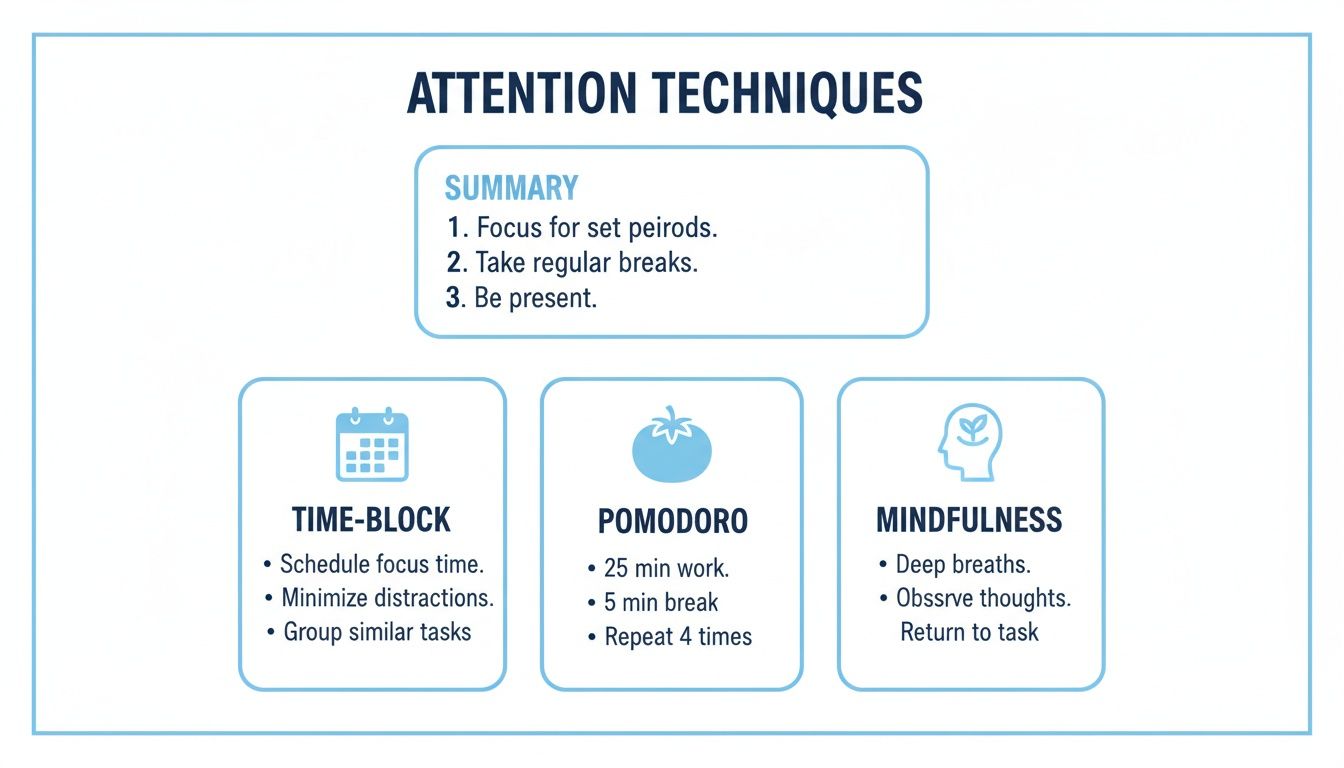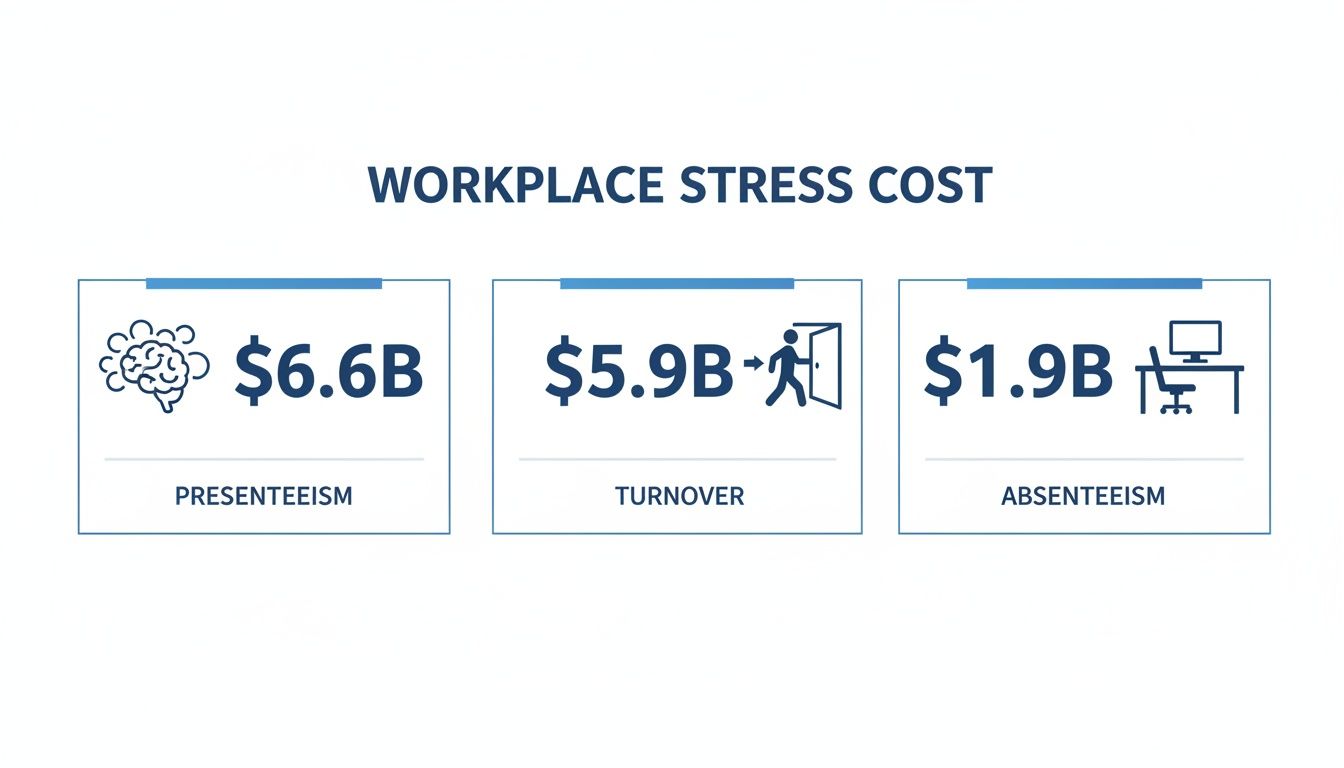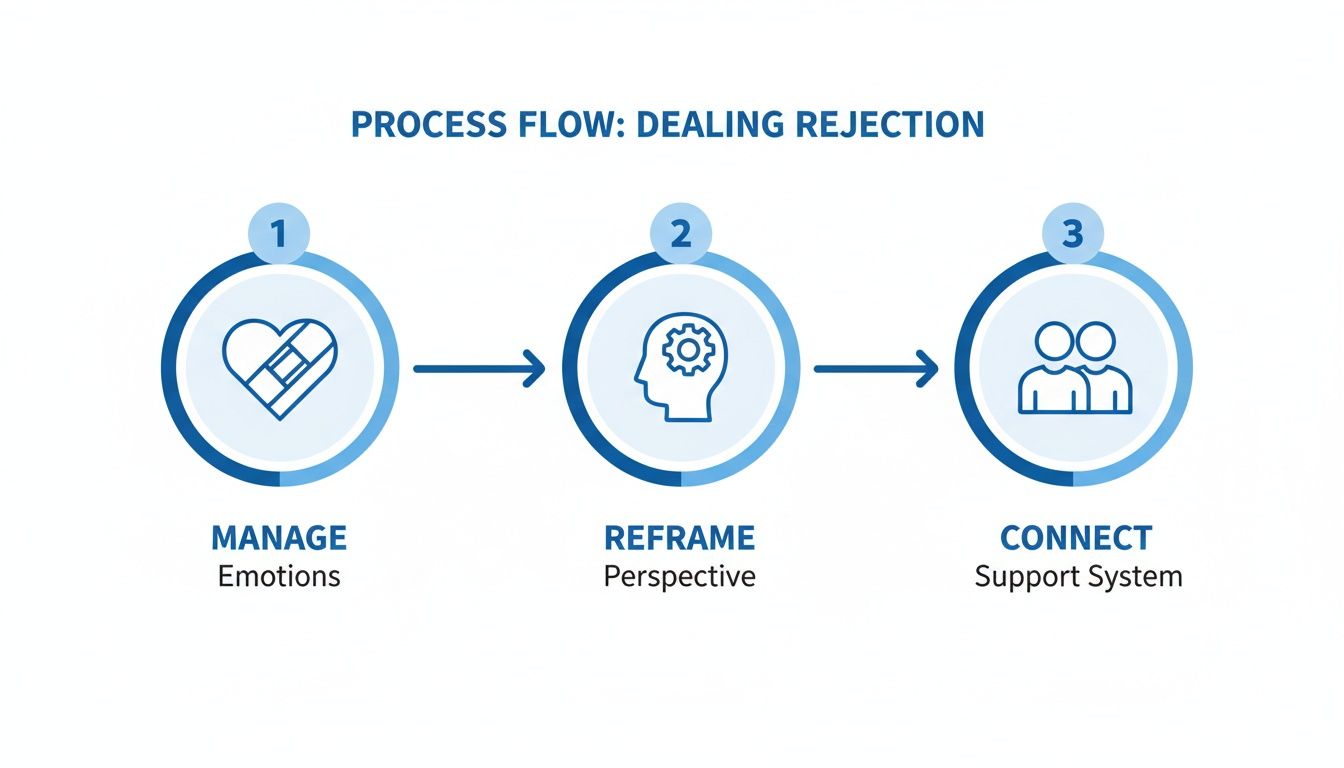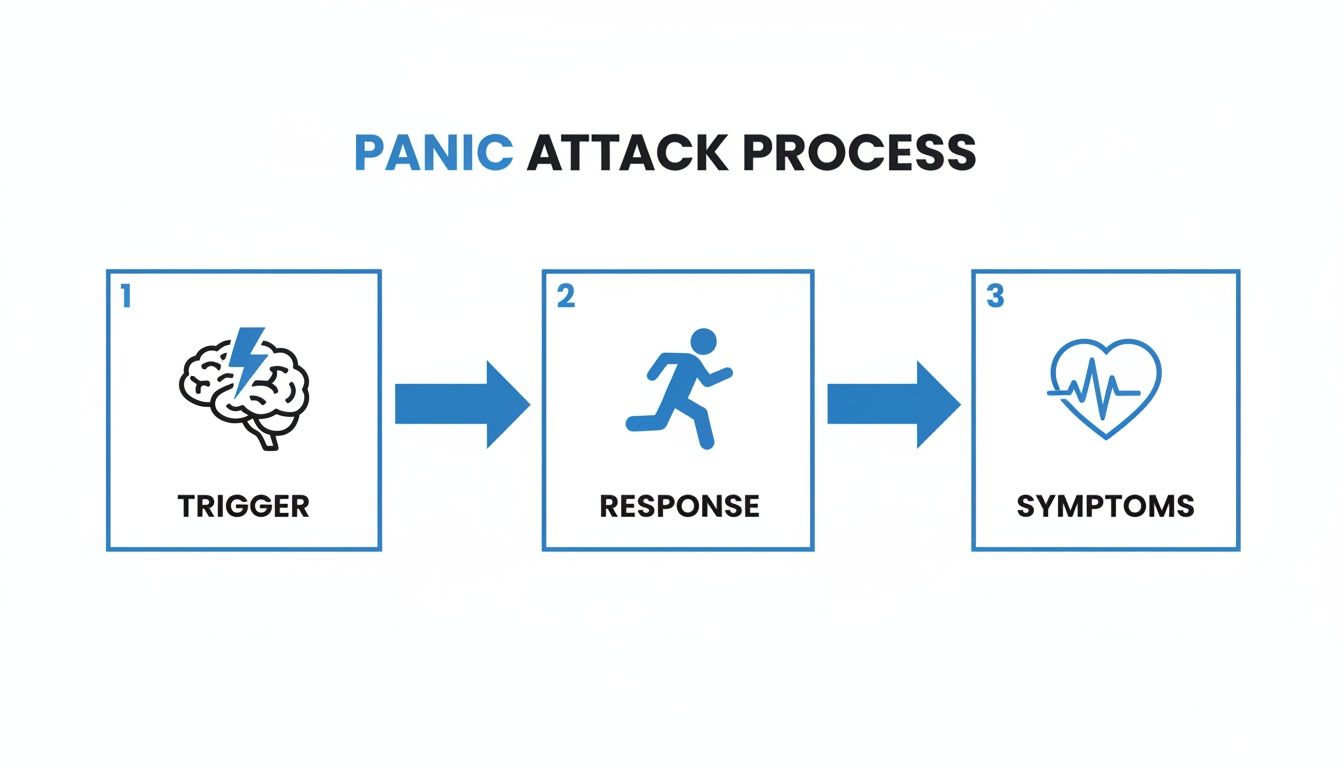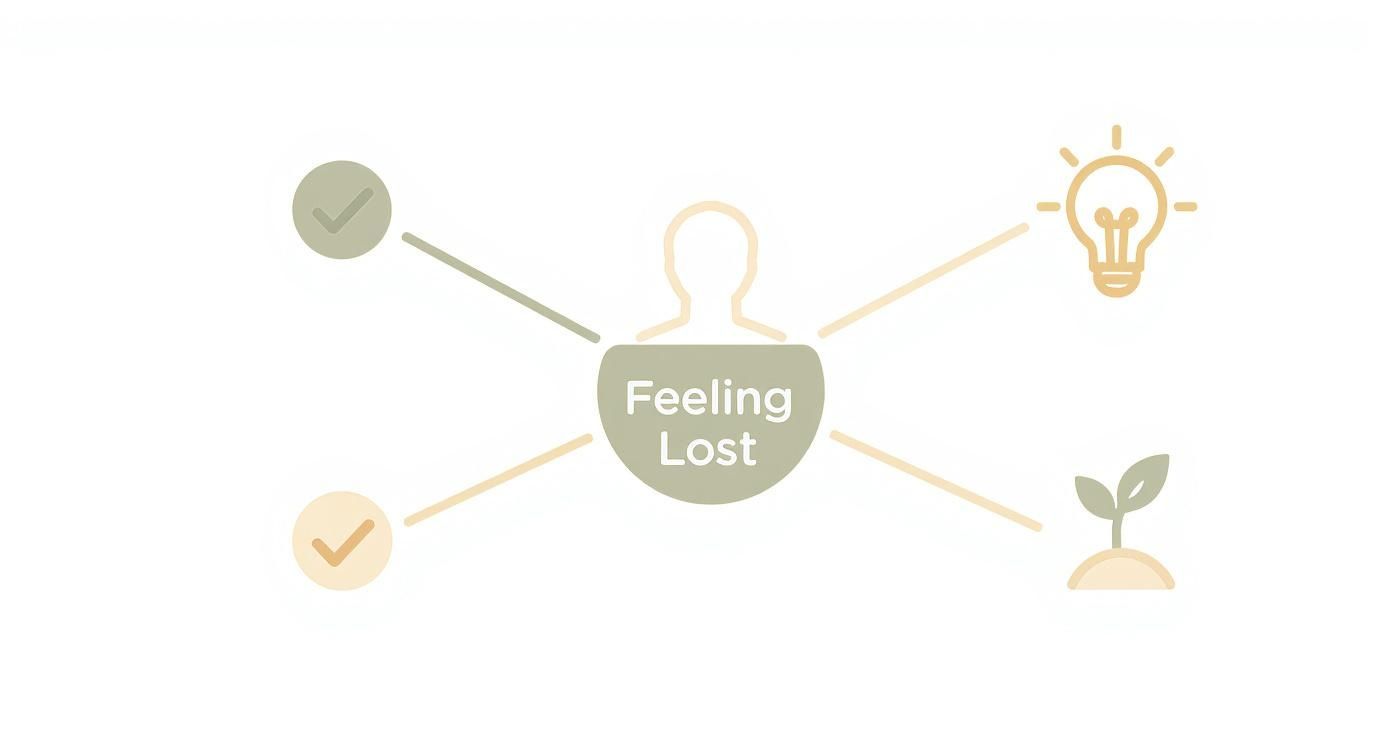Feeling like your thoughts are moving through a thick cloud? You are not alone. A brain fog test can be a helpful tool to understand these feelings of distraction and mental slowness. It's important to remember these assessments are for your information and are not a medical diagnosis. Think of them as a gentle starting point to make sense of your experience.
Understanding That Foggy Feeling in Your Head
Brain fog is not a condition by itself, but rather a sign that something else may need attention. Imagine trying to navigate a familiar street when a dense fog rolls in. You know where you are, but everything feels unclear and just out of reach.
This mental cloudiness can show up in many ways, making simple tasks feel challenging. In India, for instance, studies on long COVID survivors show that around 7.2% report a lingering cognitive haze. This can make it hard to remember appointments or follow a conversation, showing how common this challenge can be. You can read more about these findings on cognitive complaints to understand the wider impact.
What Does Brain Fog Feel Like?
While everyone’s experience is unique, some common feelings include:
- Difficulty concentrating or staying focused on one thing.
- Thinking that feels slow, as if your mind is running on low power.
- Forgetting words or losing your train of thought mid-sentence.
- Feeling overwhelmed by everyday decisions or simple information.
These feelings are often linked to challenges that affect our general well-being, like workplace stress, anxiety, or burnout. The fast pace of modern life can drain our mental energy, contributing to this fatigue. Acknowledging these triggers is a key step toward building resilience.
Brain fog can be your mind’s way of signaling it needs some attention and compassion. It is not a sign of failure, but an invitation to check in with your mental and emotional health.
Simply acknowledging this feeling without judgment is a powerful first step toward finding clarity. A brain fog test can offer valuable insights, helping you see connections between your lifestyle, stress, and emotional state. This awareness empowers you to find the right support, whether it's making lifestyle changes or seeking therapy for underlying concerns like anxiety or depression.
Getting to the Root of Brain Fog
Understanding what's behind the mental haze is the first step toward clearing your head. Brain fog is a symptom—a signal that something in your life or body may be out of balance. It's like a 'check engine' light for your mind, letting you know your mental resources are stretched thin.
Often, this feeling is a result of the pressures of modern life, which can lead to chronic stress. When your body is constantly in a high-alert mode, your brain can become overwhelmed. This can make it difficult to focus or think clearly.
The Impact of Stress and Our Emotional State
Long-term stress is a significant contributor to mental exhaustion. The constant release of stress hormones can interfere with brain function, creating challenges with memory and concentration. Many people experience this when dealing with high levels of workplace stress or academic pressure.
Ongoing anxiety is another major factor, as your mental energy is spent managing worried feelings, leaving little for anything else. Similarly, depression can slow down your thinking, making it hard to engage with the world. These are real health challenges that deserve compassion and support.
Feeling mentally foggy is often a response to prolonged emotional strain. Addressing challenges like burnout and anxiety through therapy or counselling is a crucial step toward improving your well-being and building resilience.
Physical and Lifestyle Triggers
A range of physical factors can also contribute to brain fog. Your diet, sleep, and general health are all deeply connected to your mental clarity.
-
Poor Sleep: Not getting enough quality sleep prevents your brain from clearing out toxins that build up during the day. This nightly clean-up is essential for healthy cognitive function.
-
Nutritional Gaps: Your brain needs the right fuel to perform well. Deficiencies in nutrients like vitamin B12 or iron can directly affect your energy and mental sharpness. For more details, you can explore insights on what causes brain fog and fatigue.
-
Hormonal Changes: Life brings hormonal shifts from pregnancy, menopause, or thyroid issues. These fluctuations can have a noticeable effect on how sharp you feel.
-
Underlying Health Conditions: Sometimes, brain fog is a symptom of an illness, like post-viral fatigue, or is tied to chronic conditions. It's always worth remembering that a brain fog test is an informational tool, not a diagnostic one.
By recognising these potential causes, you are empowered to take the next step. Pinpointing which areas of your life might be contributing to the fog is the start of your journey toward greater clarity, happiness, and resilience.
Exploring Different Types of Brain Fog Assessments
When you're dealing with a persistent mental haze, understanding what’s happening can feel like a challenge in itself. This is where a brain fog test can be useful. Think of it not as a diagnostic tool, but as a way to get a snapshot of your cognitive well-being.
These assessments are like a fitness test for your mind. A physical fitness test measures strength, flexibility, and endurance separately. In the same way, a cognitive assessment looks at your mental "muscles"—like memory, attention, and how quickly you process information.
Starting with Self-Assessments
An easy place to begin is with a simple self-assessment. These are often informal checklists that prompt you to reflect on your daily experiences. You might be asked how often you lose your keys, struggle to find the right word, or feel drained by simple mental tasks.
This kind of brain fog test is a gentle way to start noticing patterns. You may realise that what you've been dismissing as an "off day" is actually a consistent issue. Recognising these trends is a vital first step in understanding how factors like workplace stress or poor sleep affect your mental sharpness.
Structured Cognitive Screeners
For a more detailed picture, structured cognitive screeners are a helpful next step. Tools like those on platforms such as DeTalks are backed by science and measure specific brain functions. These might involve tasks designed to test your short-term memory, reaction time, or ability to maintain focus.
These screeners provide more objective data to work with. The results can help you move from a vague feeling of being "off" to a clearer understanding of your cognitive resilience and overall well-being. It’s an empowering step toward taking charge of your mental health.
A Quick But Important Note: Please remember that all of these assessments are informational tools. They offer valuable insights, but they are not a substitute for a professional medical diagnosis. Their real power is in giving you a starting point for a meaningful conversation with a doctor or therapist.
The diagram below shows how many everyday factors can contribute to that foggy feeling.
As you can see, our mental clarity is deeply connected to our daily habits—from how we manage stress to the quality of our sleep and nutrition.
To help you understand the options, here's a quick comparison of the different types of assessments available.
Comparing Different Types of Brain Fog Assessments
| Assessment Type | What It Measures | Best For | Example |
|---|---|---|---|
| Self-Assessment Screener | Your personal experience and perception of daily cognitive challenges. | Getting a preliminary sense of your symptoms and identifying personal patterns. | A simple online questionnaire asking about memory lapses or concentration difficulties. |
| Brief Cognitive Test | Specific cognitive functions like memory, attention, and processing speed using structured tasks. | Gaining objective data on your cognitive performance to share with a professional. | An interactive digital test that measures reaction time or recall ability. |
| Comprehensive Clinical Evaluation | A deep and wide-ranging look at cognitive function, medical history, and potential underlying conditions. | Investigating persistent or severe brain fog that significantly impacts daily life. | A full neuropsychological workup administered by a psychologist or neurologist. |
| Laboratory Tests | Biological markers such as vitamin deficiencies, hormonal imbalances, or inflammation. | Ruling out or identifying physical health issues that could be causing cognitive symptoms. | Blood tests ordered by a doctor to check thyroid function or B12 levels. |
Each assessment serves a different purpose, helping you build a more complete picture of what's going on, one step at a time.
When to Consider a Clinical Evaluation
If a self-assessment raises concerns, or if brain fog is significantly impacting your work and life, it may be time to seek a clinical evaluation. This is a deeper assessment conducted by a healthcare professional like a psychologist or neurologist.
Here’s what that process often looks like:
- Detailed Interview: A thorough conversation about your symptoms, health history, and lifestyle.
- Neuropsychological Testing: Standardised tests that measure a wide range of your cognitive abilities.
- Lab Tests: Blood work to check for factors that can cause brain fog, like nutritional deficiencies or hormone imbalances.
This level of assessment is essential if there's a possibility that the fog is linked to an underlying issue like anxiety or depression. Seeking professional guidance through therapy or counselling can help get to the root of these problems, putting you on a path toward better mental clarity and happiness.
Take This Simple Self-Assessment for Brain Fog
Sometimes, the best first step is to simply pause and check in with yourself. This is not a medical test, but a chance for honest self-reflection to notice how you've been feeling. It is for your information only and is not a diagnostic tool.
Think of these questions as a quiet conversation with yourself. As you go through them, reflect on your experiences over the past two weeks. There are no right or wrong answers here; this is an opportunity to listen to what your mind and body may be telling you.
Gentle Questions for Self-Reflection
Find a quiet moment and consider how often you've felt the following. Be honest and gentle with yourself.
- Mental Sharpness: "How often have I felt that my thinking is sluggish or slow?"
- Concentration: "How often have I struggled to focus on a task, a conversation, or even just reading a book?"
- Word Finding: "How often have I had trouble finding the right word when I'm speaking or writing?"
- Memory: "How often have I forgotten simple things, like why I walked into a room or what I needed from the shop?"
- Mental Fatigue: "How often have I felt mentally exhausted by tasks that used to be easy?"
- Overwhelm: "How often have I felt easily swamped by information or simple decisions?"
- Disorientation: "How often have I felt confused or a bit lost, even in familiar surroundings?"
Please remember, this self-check is an act of self-compassion. Its only purpose is to help you gain personal clarity, not to label your experience.
Understanding Your Observations
After reflecting on these questions, you might begin to see a pattern. Perhaps you notice that mental fatigue is strongest after a stressful day, or that your memory feels fuzziest when you haven't slept well. This is incredibly valuable information.
A brain fog test like this helps turn a vague feeling into something more concrete. Validated tools like the Brain Fog Scale (BFS) are used in studies to measure factors like mental fatigue, giving a clear way to quantify these experiences. You can learn more about the validation of such scales to see how researchers approach this.
If you're noticing a consistent pattern, it doesn't mean something is wrong with you. Think of it as a gentle nudge—a sign that your brain is asking for more support. It’s an invitation to explore what might be happening, whether it's workplace stress, underlying anxiety, or burnout.
Recognising these signs is a proactive step towards improving your well-being. It might mean it’s the right time to consider speaking with a professional. Exploring therapy or counselling offers a supportive space to unpack underlying issues, build resilience, and find your way back to mental clarity and happiness.
How To Interpret Your Results And Plan Next Steps
Completing a brain fog test provides a snapshot of your current mental clarity. Approach your results with curiosity, not criticism. Remember, this is a momentary glimpse, not a permanent label.
Your results can act as a compass, helping you recognise patterns. Perhaps late-night work emails are clouding your mind, or irregular sleep is affecting your sharpness. This awareness is a powerful first step toward positive change.
Taking Positive Action For Your Well-Being
Seeing these patterns can be validating. Small, steady steps often make the biggest difference in building on that insight.
Here are some supportive ideas to begin your journey:
- Prioritise Restful Sleep: Aim for a consistent bedtime and unwind with a simple routine like dimming lights or gentle stretches. Quality rest is a powerful tool against mental fatigue.
- Mindful Movement: A daily walk or a few minutes of yoga can increase blood flow to your brain and ease tension. It’s about finding joyful activities that energise you.
- Nourish Your Brain: Enjoy colourful fruits, vegetables, and healthy fats from nuts, seeds, or avocados. Staying hydrated also helps your brain function smoothly.
Your assessment results are a compass, pointing you toward areas where you can cultivate greater resilience, self-compassion, and happiness.
Knowing When To Seek Professional Support
Sometimes, lifestyle adjustments are not enough, especially when dealing with persistent anxiety or burnout. If foggy thinking is impacting your work, family, or daily life, reaching out for help is a sign of strength.
Therapy and counselling provide a safe space to explore things more deeply. A professional can help you navigate difficult thoughts, manage stress effectively, and build lasting coping skills.
Indian cohort studies show how assessments can flag underlying issues. For example, 39.7% of one post-COVID group fell into a “poor functioning” category, highlighting links between brain fog and mood. You can discover more about these findings on cognitive function and their implications for well-being.
Whether you start with lifestyle changes or connect with a therapist, you are taking an important step toward clearer thinking and a more fulfilling life.
Your Path to Regaining Mental Clarity
Living with brain fog can feel frustrating and isolating. If you’ve taken a brain fog test, you have already taken a positive first step. It is an act of self-care that prioritises your well-being, moving you from confusion toward understanding.
This journey is about gently building your resilience, not finding a quick fix. The insights you gain are tools for understanding what your mind needs, especially when facing workplace stress or anxiety. Remember, feeling foggy is a signal, not a personal failing.
Embracing Self-Compassion and Resilience
The path forward is yours to build, one small, sustainable step at a time. It's about nurturing your mind and body with kindness.
- Be Kind to Your Mind: Acknowledge that you're doing your best. Self-compassion is a powerful antidote to the frustration that brain fog can bring.
- Focus on Well-Being: Small lifestyle changes can lead to big shifts. Now that you have a better understanding, exploring practical tips on how to reduce brain fog is a great next move.
- Celebrate Small Wins: Did you get a good night's sleep or take five minutes to breathe? Every small step is a victory toward clearing the fog and finding more happiness.
Taking charge of your mental health is a journey of resilience. Each step you take, no matter how small, is a positive move for your well-being.
If you’re ready to take the next step, DeTalks is here to offer a safe, supportive space. You can explore our scientifically validated assessments or connect with a qualified professional for therapy or counselling. You don't have to walk this path alone; we're here to help you find your way back to clarity.
Your Brain Fog Questions, Answered
If you're trying to make sense of brain fog, you're not alone. Let's walk through some of the most common questions. Here, you can find clear, supportive answers for your path forward.
Can a Brain Fog Test Actually Diagnose a Medical Condition?
No, a brain fog test is an informational tool, not a diagnostic one. It is designed to help you recognise and quantify your experiences and spot patterns. Think of it as a helpful first step in building self-awareness.
For a formal diagnosis, it is essential to see a qualified healthcare professional. They can perform a full evaluation to understand the complete picture of your health.
How Long Does Brain Fog Usually Last?
This varies for each person because it is closely tied to the underlying cause. For some, it may be temporary, perhaps after a poor night's sleep. For others, it can feel more persistent if it’s linked to chronic conditions or ongoing challenges like anxiety or depression.
Tracking your symptoms can be helpful. Understanding when brain fog happens and what makes it worse can help you and your doctor find effective strategies. This is a proactive way to build your mental resilience.
Taking a brain fog test is an act of self-care. It provides valuable insight that empowers you to have a more informed conversation with a doctor or therapist about your mental clarity and overall well-being.
Can Therapy or Counselling Help with Brain Fog?
Absolutely. Therapy can be very helpful, especially when brain fog is connected to workplace stress, burnout, anxiety, or depression. A therapist can help you identify thought patterns that drain your energy and teach you practical coping strategies.
Counselling offers a safe, supportive space to explore what’s really going on. It’s a powerful step toward clearing the fog and feeling more like yourself again.
Ready to gain clarity and take the next step in your mental health journey? Explore scientifically-backed assessments or connect with a compassionate therapist on DeTalks. Start your path to well-being today at https://detalks.com.


